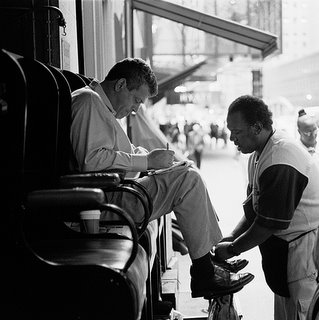The Enduring Assumption of Black Servitude

Recently, my friend John and I were discussing a problem that we keep having. We both have extremely busy schedules Monday through Friday so we find ourselves confined to running around shopping and doing errands on the weekends. From time to time, we’ll venture into Sam’s Club or Costco to pick some things up. Without fail, whether we’re by ourselves or with our families, someone will approach us and ask us if we work there. This might sound somewhat innocuous if not two things: we’re both black and every single person who’s asked us the question is white.
Before you accuse me of playing the oft-referred to “race card” (and I’ll be submitting a lengthy commentary regarding whites who disingenuously accuse blacks of doing just that in a future post) keep in mind that neither John nor I were wearing blue or red vests, name tags or any other identification that might lead one to believe we were employed by these companies. Neither were we assisting any other customers or giving anyone directions. Generally, we were wearing some standard combination of blue jeans and a shirt and, dutifully playing the role of consumers ourselves when we’ve been approached.
I’ve come up with two reasons why this continues to happen.
1) It is the result of an assumption of dominance – on the part of the white people who ask this question – or, at the very least, the belief that a customer/servant relationship automatically exists between whites and blacks and/or
2) Of the roughly 37 million black people living in this country, the only ones with whom these whites generally interact are usually operating in a service capacity.
I simply can’t explain it any other way. I cannot imagine a scenario in which a clean-cut, middle class, thirty-something white man and his equally middle-class white buddy walk into a Costco, occasionally with family in tow, and repeatedly have someone ask for their help finding the diapers or the plasma televisions. The postulation of supremacy is so clear in this that it has progressed from being slightly amusing to annoying to downright insulting. John and I are both reasonable men. But when someone asks us to help them with a purchase what we’re beginning to hear now is, “Pardon me, boy. Since you can’t possibly be here to make a purchase would you be so kind as to do your job and help me out?”
Of course, not many whites would equate the assumptions that lead to these retail interactions with racism. The overwhelming majority of white people with whom I’ve interacted not only do not grasp the concept of institutionalized racism, they apparently can not acknowledge the presence of racism at all outside of a white sheet and hood (more on this later also). But like it or not, racism is exactly what this amounts to. Consider this. These help-seekers unknowingly concede that in this country there exists a permanent black underclass whose continued presence they not only benefit from, but seek to exploit. After all, it’s convenient to have a Negro around to help with the bags or take your order or shine your shoes. And since we’re generally viewed as a collective “other” rather than as individuals, it makes perfect sense for them to randomly assign this status to any black person beside whom they happen to be standing when they’re doing their weekend shopping.
As for John and I, we’re considering wearing t-shirts that read, “Believe it or not, we’re actually here to buy some shit!”
Labels: Arrogance

